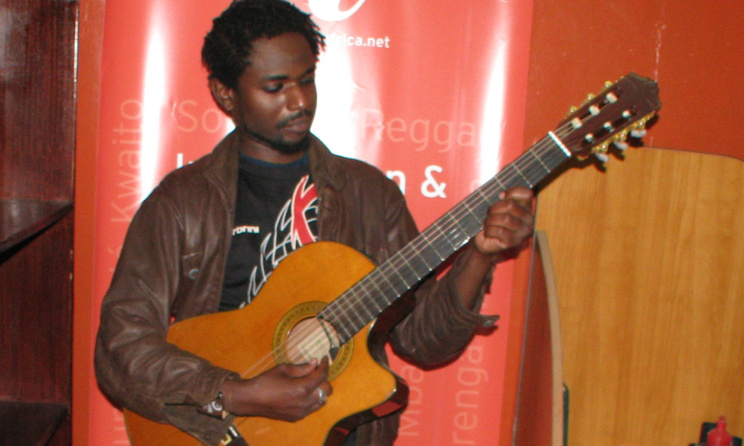Interview with Yasin Kinyonga of the Simba Wanyika band.
By Stanley Gazemba
 Yasin Kinyonga at the Music in Africa office, Nairobi.
Yasin Kinyonga at the Music in Africa office, Nairobi.
SG: Please introduce yourself and tell us something about your musical background.
YK: My name is Yasin Kinyonga, son to the late Wilson Peter Kinyonga of Simba Wanyika band. I play the sax, guitar, tumbas and sing. Although I currently play with another band, my real band is Simba Wanyika original. We usually meet for practice. But then when we experience challenges of finding work as the whole band we usually break up temporarily, with everyone going their own way to find work.
SG: where were you born and where?
YK: I was born here in Nairobi at Park Road Nursing Home in Eastleigh in 1983.
SG: When did you get into music?
YK: I started serious music in 1998. But ever since I was in school I loved music a lot. I loved listening to my dad’s record player, and at some point I thought that there were people living inside the record player! I have played with various bands, among them Everest Kings, Maroon Commandos, Twanga Pepeta of Tanzania, DDC Mlimani Park, Shikamoo Jazz in Dar es Salaam, and others. Right now I’m playing with Bora Bora Sound, previously known as Mars System, led by Abu Omar Shaaban, formerly of Simba Wanyika. Omar is the composer of famous songs like ‘Wivu na Fitina ni Sumu ya Mapenzi’. Bora Bora Stars currently plays at Simmers Restaurant (in Nairobi’s CBD) every Saturday and Sunday.
SG: So is Nairobi your base?
YK: Yes, I am based here in Nairobi, although occasionally I move to Mombasa because that is where my mother comes from.
SG: Tell us about your own compositions that have been recorded so far.
YK: Personally I’ve recorded a number of songs, one being ‘Rozzy’, which didn’t do very well because I had a disagreement with the producers. I have mostly recorded in the hip-hop and zouk style. I’ve recorded ‘Kama Hunitaki Mpenzi’, ‘Dunia Msongamano’ and others.
SG: Where does your musical inspiration come from?
YK: The first person I look up to musically is my late dad, Wilson Peter. He is the one who inspired and mentored me. I was drawn by his guitar and singing, together with that of his younger bro, George Peter. Them and DDC Mlimani Park were my main sources of inspiration. They made me strive to reach their level.
SG: How come you are inspired by bands doing dansi music and yet you are a hip-hop artiste?
YK: Hip-hop is what I started out doing. But then people told me that I needed to go back to the elders to learn good music. They said hip-hop was a passing fad, and that if I wanted to make music that would last I had to go back to our indigenous music. So I joined Everest Kings as a singer. We played in Kitengela, Athi River and other places. After I had gained some skills from them I left to join Maroon Commandos. We played with Maroon at Ronalo Restaurant for a while before I travelled to Tanzania and joined DDC Mlimani Park. We played with DDC for two or three months before I joined Twanga Pepeta. I played with them for a while, participating in recording songs like ‘Mtu Pesa’ and others. Next I returned here (Nairobi) to work on my own compositions. So far I have recorded a number of singles, enough to fill an album. The only challenge is I haven’t found someone experienced enough who can manage and release them to the market. Most producers tend to use artistes and pay them nothing. I am cautious of having my music popular out there and yet I am not making any money from it. But my music is there. I have uploaded one of the songs on Youtube and it is doing very well.
SG: Other than untrustworthy managers, what are the other challenges you experience?
YK: The first one is finding work. It is difficult to land regular gigs. Also the costs of recording are very high. After you have negotiated the studio costs you next have to contend with pirates, who will be waiting for your music. They are a real menace. I released some remixes of my dad’s songs, among them ‘Shilingi Yaua’, ‘Halleluya’ and others. They are doing very well in the mainstream media. But when I walk around town I find them selling for 50 shillings in Muthurwa Market, or even for as low as 20 shillings. It is very heartbreaking, and causes me to lack faith in my work. If we can end this piracy so that musicians can benefit from their sweat it will be a good thing.
Another concern is MCSK (Music Copyright Society of Kenya). MCSK’s mandate is to look out for the rights of us, musicians. But now it has become like they only look after their interests. Whenever us, musicians, go there we find so many conditions they make a visit to a mganga (shaman) seem like a walk in the park! They take our music but never remit any money they receive for it. This matter has to be investigated.
SG: So what do you think needs to be done? What do you want the government to do?
YK: I think this is a matter beyond the government. It is up to us musicians. This is our organization. It is up to us to stand up and kick out the corrupt officials inside there. It is us who elect them and so we can vote them out. We as musicians have the numbers to do it- over a million of us, if we unite we can end all this corruption.
SG: Earlier on you mentioned recording as one of the challenges. If I look at the situation now, technology has made it much easier to record than during the days of your parents. Now studios are opening all over the place, even in people’s living rooms. People are hooking up their laptops to a keyboard and mike and recording themselves at home. What do you have to say to that?
YK: That is true. But then this computer music is the other challenge. To be honest that ease in recording is one reason why modern music doesn’t last. You know music isn’t just singing. You have to know what you are singing about. You have to compose. Those older musicians like my dad and people like Isaiah Mwinamo were the masters of composition. People like (Ketebul Music’s) Tabu Osusa were the master producers. It is my hope that one day I will approach them with my music so that we can work together to refine it. They understand the craft of making good music. A good number of the producers we have today don’t even understand music production.
SG: Can you say something about the stage show of our modern musicians compared to the earlier bands you mention. What can you say about the quality of the stage shows?
YK: The problem is that our generation of musicians has lost it. We don’t like to learn from the more experienced people. We like taking shortcuts. We compose a song in a day and the next thing on our mind is a fancy car, a nice house and all that. What we forget is that music has a procedure. There’s nothing as irritating to me as a musician who uses playback in his shows. There’s a day I was playing with Kayamba Afrika band, and they were using a CD. We all know that sometimes the CD develops a scratch or something. I cautioned them against doing that and advised them to play live, but they ignored me. Believe it or not the CD got stuck during the show and the guys were left lip-synching. It was very embarrassing. I would encourage musicians my age to take time to learn at least an instrument. It will be for their own benefit. It is the one reason I respect musician Eric Wainaina a lot. His approach is quite different. There is also Harry Kimani, Mercy Myra…they have that touch. I would urge my fellow musicians to follow suit so that we can grow our music the way our forebears did. Shortcuts only ruin the business.
SG: Tell us about your ongoing project with Mzee John Nzenze (a first-generation musician)
YK: To be honest, I value the old man (John) a lot. He is teaching me lots of things. We are working on remixing the songs he did in the 60s and 70s so that we can give them a modern touch. I am helping him to transform his music from the analogue format that was used to record it to the modern digital format so that they can be accessed by everyone. A lot of young people these days have no time for old music that doesn’t conform to their ‘yo-yo’ lifestyle. John decided he didn’t want to be left behind in the technological transformation and so he invited me to work with him. I am happy to work with him and excited to learn from him. We have selected some of his songs which we’ll compile into a modern album. So far we have done ‘Angelike Twist’ among others.





















Comments
Log in or register to post comments